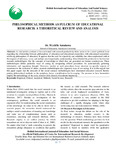| dc.description.abstract | As universities continue to be confronted with research productivity there seems to be a micro-political issue
regarding the relationship between philosophers of education and educational researchers with educational researchers
sidelining philosophers of education. It appears that the zeal for objectivity and reliability has often emphasized truth at
the expense of relevancy, value, and perhaps most importantly, understanding. It has blinded the profession to the fact that
research methodologies, like the concepts of knowledge in which they are grounded, are human constructions. These
methodologies define particular ways of seeing by designating refined procedures for systematically gathering
information and organizing thought. Moreover, insofar as such procedures focus attention on specific aspects of
experience to the exclusion of others, research methodologies also represent ways of not seeing. It is in this regard that
this paper argues that the demands of the social sciences methodologies have dominated education research thereby
putting philosophical methods on the periphery, hence a justification for leveraging. The pressure to have humanities
employ the methodology of the social sciences risks chances of academic hegemony. | en_US |

